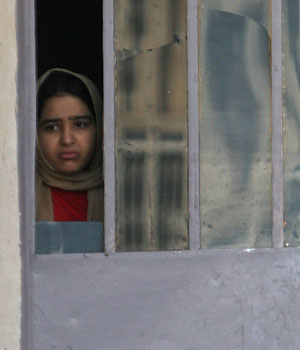
An Iraqi girl watches the scene from behind a door following a car bomb explosion in Baghdad, Thursday, Feb. 16, 2006 (AP)
BAGHDAD, Iraq (AP) – The Shiite-dominated Interior Ministry has announced an investigation into claims of death squads in its ranks as police found a dozen more bodies, bringing the number of apparent victims of sectarian reprisal killings here to at least 30 this week.
The probe was announced Thursday after U.S. military officials indicated there was evidence to support the allegation of death squads. The 12 men found on Thursday had been bound and shot in the head execution-style.
At least 27 other people were killed in violence across Iraq, including three tribal sheiks slain in a drive-by shooting. Three supporters of anti-U.S. cleric Muqtada al-Sadr died in a mortar barrage, and gunmen killed two owners of a convenience store that sold beer. Islamic extremists often target shops selling alcohol or DVDs deemed pornographic.
Sunni Arabs have been complaining for months that kidnappings and murder by Shiite-led commandos operated by the Interior Ministry are driving many Sunnis into the ranks of the insurgents. Shiites insist that they must retain control of Iraqi security forces in the next government.
In the death squad case, Iraqi security officials said the Interior Ministry probe would focus on a single incident involving 22 Iraqi policemen who U.S. authorities said were detained last month before they were able to kill a Sunni Arab man north of Baghdad.
“They were dressed as Iraqi highway patrolmen but only four of those individuals were planning to conduct a kidnapping and subsequent murder of a Sunni individual,” Maj. Gen. Rick Lynch told reporters Thursday.
U.S. Maj. Gen. Joseph Peterson, who commands the civilian police training teams in Iraq, gave a slightly different version to the Chicago Tribune for a story Thursday about the death squad.
Peterson said the 22 men were wearing police commando uniforms but turned out to be employed by the Interior Ministry as highway patrol officers. He said four were believed to be ringleaders while the 18 others were likely following orders. All were picked up at a checkpoint.
“We continue to believe that there’s more of these out there,” he said.
But Lynch said this could have been an isolated incident. “We have no indication they have done this in the past,” he said. “All we know this is an isolated incident. We are not saying it couldn’t have happened (previously), but we are not aware of it.”
Maj. Gen. Hussein Kamal, who announced the investigation, said the four policemen identified by Peterson as ringleaders had been transferred to the U.S.-run Abu Ghraib prison in western Baghdad and the rest were held in Iraqi jails.
Kamal, Iraq’s deputy interior minister in charge of domestic intelligence, hinted that the scope of the probe could go beyond the 22 policemen arrested last month. “After Iraqi authorities were informed by the Americans about the so-called commando forces engaging in assassinations, the interior minister immediately formed an investigation committee to uncover what has actually happened,” Kamal said.
The U.S. military has been fighting a tough battle to rebuild a legitimate Iraqi security force that it hopes will eventually replace American-led coalition forces and maintain order throughout the country.
There is no shortage of Iraqis, particularly in Baghdad, who say family members have been kidnapped and killed by men wearing police uniforms. “Interior Ministry special forces detained my brother and four cousins two weeks ago from (Sunni Arab) al-Aqsa Mosque in northern Baghdad’s Shula neighborhood,” said 24-year-old security guard Ayad Ali Mahdi.
“After two days, their bodies were found in pickup truck on a highway. It was horrific. Their bodies were tortured and mutilated by drills and an oxyacetylene welder,” Mahdi said.
The relative of another victim described how two dozen men wearing security forces uniforms broke into his northern Baghdad home last month, pushed his pleading wife aside and dragged out his two brothers, the only men at home at the time.
“We contacted many police stations searching for them but couldn’t find any trace. After nine or 10 days, we heard 36 dead bodies were found near (the southern Iraqi city of) Kut, and I found my brothers among them,” said Sunni Arab taxi driver Youssef Abdul-Karim, 35.
“They were blindfolded, handcuffed and severely tortured. One of my brothers had drill wounds in his head, while the other was shot in the head and chest.”
A Sunni Arab political group, the Iraqi Islamic Party, welcomed the Interior Ministry investigation and said perpetrators should be brought to justice.
Iraq’s human rights minister, Nermine Othman, said Interior Ministry officials have been behind numerous execution-like murders, either by taking part in the roundups and killings or providing police uniforms, information on potential victims and weapons to culprits.

Iraqi President Jalal Talabani (R) gestures as he speaks beside Tareq al-Hashimi, Islamic Party’s secretary-general, during a news conference in Baghdad, February 16, 2006 (REUTERS)

Iraqis calm their relative as he mourns an army captian who was killed by unidentified militants along with a soldier in the northern city of Kirkuk, 16 February 2006 (AFP)
